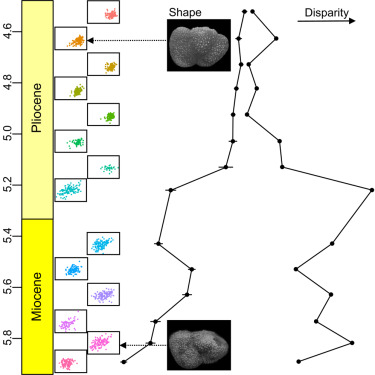In a previous post, I indicated that Dr. Frances Arnold’s Nobel Prize in Chemistry points out that Artificial Selection is more powerful a force than Natural Selection.
In a new paper, the authors show that the idea of the ‘gradual’ evolution of foraminifera turns out to be wrong and that what actually happens is an “abrupt” evolution.
Neogene planktonic foraminiferal fossil lineages have been used to interpret gradualism (Arnold, 1983; Belyea and Thunell, 1984; Wei, 1987; Wei and Kennett, 1988), PE (Wei and Kennett, 1988), and punctuated anagenesis (Malmgren et al., 1983, 1996). However, the last decade has seen the emergence of sophisticated model-fitting techniques for time series that are ideal tools for testing the evolutionary tempo and mode (Hunt, 2006, 2008; Hunt and Carrano, 2010; Hunt et al., 2015). These advances call for a re-evaluation of the previously interpreted evolutionary patterns, and a consideration of understudied late Neogene lineages, such as Truncorotalia, examined here.
Recent truncorotalid diversity is related to the evolution of Truncorotalia crassaformis, an extant species that arose after the Miocene/Pliocene boundary from a contentious ancestral species (Hornibrook, 1981; Kennett and Srinivasan, 1983; Cifelli and Scott, 1986; Bylinskaya, 2004; Boudagher-Fadel, 2012; Scott et al., 2015). Notably, Arnold (1983) hypothesized a gradual transition from Truncorotalia juanai (=Hirsutella cibaoensis in Arnold (1983)) toward T. crassaformis across the boundary.
However, by using semilandmark geometric morphometrics and maximum likelihood-based time-series analyses (Hunt et al., 2015) we reveal an abrupt evolutionary transition along the Truncorotalia lineage after the Miocene/Pliocene boundary (Crundwell and Nelson, 2007). Our results therefore contradict previous theories and preclude the need for an intermediate form along the transition (sensu Cifelli and Scott, 1986).
So, Darwin’s notion that NS is much more powerful (over time) than AI, and the idea that all change happens ‘gradually’ (natura non facit saltus) are turning out to be wrongheaded.
So, what’s left of his theory? Extinction, which is tied to his Principle of Divergence.
And, of course, as Darwin’s “bulldog,” Thomas Huxley, brought up to Darwin on more than one occasion, breeders have not been able to duplicate this Principle of Divergence either; that is, you can’t turn a rat into a mouse, or vice versa.
So, what exactly is left of his theory?
And if Darwinian theory is collapsing before our very eyes, what will take its place?
